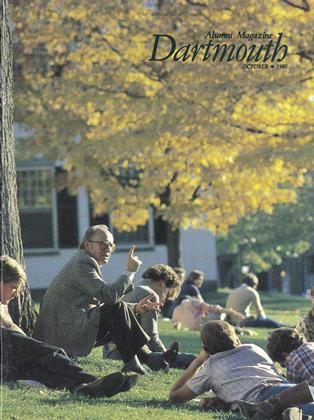The College's Minimum Standards program for fraternities and sororities, in addition to mandating the cleanliness of houses, has also had an impact in less visible ways. Lectures, concerts, and other cultural activities are sponsored regularly by the Greek system, and many houses have undertaken community service projects. Through local social service agencies and non-profit organizations, fraternities and sororities are contributing much to the Upper Valley area.
Some houses have well-established annual service projects, such as a Thanksgiving basket that Beta Theta Pi has done for some years. Another fraternity, Psi Upsilon, has sponsored a threeday camp the last three summers for teenage diabetics, in association with Hitchcock Hospital. The brothers arrange an array of activities for the campers-movies, aerobics, a canoe trip, and even an evening visit to the hot tubs while Hitchcock plans seminars on managing diabetes. Robert Hunger '86, who directed the program this summer, explains that one of the program's main purposes is to give campers a chance to discuss their disease with someone else who has it. He says that "the whole house rallied behind the camp." To fund the program, the house sponsors a barrel jump at Winter Carnival and obtains grants from the President and the Dean and donations from local businesses.
Delta Delta Delta sorority has developed another ongoing project in conjunction with Hitchcock Hospital. The Tri Delt sisters have bought a number of audio cassette players and have taped favorite children's stories to entertain the children who come to Hitchcock's Norris Cotton Cancer Center for chemotherapy treatment. While the children sit in the waiting rooms or treatment rooms, they can occupy themselves with Golden Books and fairy tales. The sisters have held an auction, a road rally in conjunction with Alpha Chi Alpha fraternity, and a dance marathon with Kappa Kappa Gamma sorority to raise funds to purchase the cassette players. They are continuing to add new players to the program and to tape new story cassettes.
Several fraternities had their pledges do a painting project for a local agency, which remarked that the brothers were "very friendly and nice . . . and responsible. The painters from one of the frats stayed even though everyone else had left," added the agency representative.
Phi Delta Alpha fraternity, which works with developmentally disabled children in a Special Olympics swimming program, "always comes to practice with enough people to all but run the practice on their own," said a Special Olympics staffer. "They are very patient, helpful, and always considerate of my athletes."
It's not just the agencies who feel positive fallout from such work. House members speak of the "immense satisfaction and enjoyment," the "discovery and camaraderie," and the "sense of responsibility" that derive from these commitments and contacts.
Eight-year-old Robbie Snider of Sunapee, N.H., a patient at Hanover's Norris Cotton CancerCenter listens to one of many tape-recorded stories in a program set up by Delta Delta Deltasorority. Tri Delt's philanthropy chair, Sharon Flanagan '87, helps Robbie read along.
 View Full Issue
View Full Issue
More From This Issue
-
 Cover Story
Cover Story"Are the fireflies ghosts?"
October 1985 By Priscilla Sears -
 Article
ArticleEfrain Guigui: Well-tempered conductor
October 1985 By Georgia Croft -
 Sports
SportsOn the road to Cambridge. The Harvard Game
October 1985 By Jim Kenyon -
 Class Notes
Class Notes1979
October 1985 By Burr Gray -
 Article
ArticleThomas V. Seessel '59: "It's okay to say 'No' "
October 1985 By Rex Roberts -
 Class Notes
Class Notes1982
October 1985 By Emily P. Bakemeier
Article
-
 Article
ArticleCourses Accredited
December 1940 -
 Article
ArticleReunion Calendar
February 1951 -
 Article
ArticleWITH THE BIG GREEN TEAMS
MARCH 1964 -
 Article
ArticleTHE COLLEGE MAN IN INDUSTRY
December, 1912 By Frederick Kenyon Brown '10 -
 Article
ArticleCAREER CHANGERS
MAY 1999 By Kathleen Burge '89 -
 Article
ArticleSonnets & Sawdust
June 1949 By NELSON BRYANT '46

